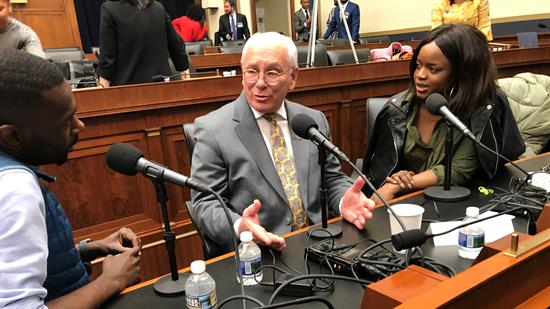- Home
- About
-
Constituent Services
- Academy Nominations
- Community Project Funding
- Congressional Art Competition
- Congressional App Challenge
- Congressional Commendation
- Event Invitation
- Grants
- Help with a Federal Agency
- Internships
- IRA Clean Energy Consumer Benefits
- Know Your Rights: Immigration
- Request a Meeting
- Request Surplus Books
- Presidential Greeting
- Visit Washington D.C.
- Issues & Legislation
- News
- 20th District
- Contact

Press Releases
Tonko Demands Answers on Trump EPA’s Clean Air Act ExemptionsTonko condemns EPA’s recent invitation for polluters to apply for mass exemptions from Clean Air Act standards & promises scrutiny of exempted entities
Washington,
March 28, 2025
WASHINGTON, DC — Today, Congressman Paul D. Tonko (NY-20) sent a letter to Environmental Protection Agency (EPA) Administrator Lee Zeldin condemning the Trump administration’s outrageous decision to encourage polluters to apply for exemption from critical Clean Air Act standards by simply sending a template email response to EPA officials. These standards, required pursuant to Section 112 of the Clean Air Act, seek to protect human health and the environment from hazardous air pollutants including asbestos, benzene, hydrogen chloride, and mercury, which are known to cause cancer and other serious health impacts. Tonko is demanding information about each regulated entity seeking exemption from these lifesaving standards, and promising close public and Congressional scrutiny of the exemptions granted through this unprecedented, slapdash process. “I was appalled to learn that EPA has invited regulated entities to apply for exemptions in lieu of complying with existing standards for hazardous air pollutants,” Tonko writes. “The invitation for mass-exemptions to these standards flies in the face of Congressional intent and could have serious public health consequences, which appear not to have been given any consideration in your exemption process.” Standards developed under Section 112 are developed under a robust public process that includes rigorous scientific analysis of the environmental and public health risks associated with air pollution, as well as consideration of new and existing cost-effective technologies that industrial sources can utilize to mitigate those risks. Under this new process, these standards could be completely undone by a simple email from a polluter to the agency responsible for protecting the public from dangerous air pollution. “While Section 112 standards have been developed through these robust processes, EPA’s public comments indicate that exemptions will be granted based on the arbitrary whims of President Trump, which may include actions to benefit his political supporters, regardless of the potential public health and environmental harms to those that live and work near these exempted facilities,” Tonko continues. “EPA and the regulated community should expect that Congress and the American people will closely scrutinize any exemptions granted through this process.” Tonko serves as Ranking Member on the House Energy and Commerce Committee’s Subcommittee on the Environment as well as Co-Chair of the Sustainable Energy and Environment Coalition (SEEC) and has been a leader for many years on efforts to limit air pollution and foster healthier, more sustainable communities across the nation.
The full letter can be read HERE and below: March 28, 2025 The Honorable Lee Zeldin Administrator Environmental Protection Agency (EPA) 1200 Pennsylvania Avenue NW Washington, DC 20460 Dear Administrator Zeldin: I was appalled to learn that EPA has invited regulated entities to apply for exemptions in lieu of complying with existing standards for hazardous air pollutants required pursuant to Section 112 of the Clean Air Act. The invitation for mass-exemptions to these standards flies in the face of Congressional intent and could have serious public health consequences, which appear not to have been given any consideration in your exemption process. As you know, Section 112 of the Clean Air Act seeks to protect human health and the environment from hazardous air pollutants. This class of emissions includes many dangerous pollutants, including asbestos, benzene, hydrogen chloride, and mercury, which are known to cause cancer and other serious health impacts. Standards developed pursuant to Section 112 are informed by public processes, which include robust scientific and public health analysis of the risks of air pollution. These processes also consider technologies and techniques that industrial sources can adopt to mitigate those risks, often relying upon existing, cost-effective solutions already in use by regulated entities. It is astonishing that these standards, which often take years to develop, could be undone simply by a polluter sending a template email response to the agency responsible for protecting the public from dangerous air pollution. While Section 112 standards have been developed through these robust processes, EPA’s public comments indicate that exemptions will be granted based on the arbitrary whims of President Trump, which may include actions to benefit his political supporters, regardless of the potential public health and environmental harms to those that live and work near these exempted facilities. EPA and the regulated community should expect that Congress and the American people will closely scrutinize any exemptions granted through this process. While Section 112(i)(4) of the Clean Air Act is clear that the President must report to Congress on the issuance of any exemption, the American people have an immediate right to know which entities are pursuing exemptions and how those exemptions may affect the air they breathe. With that in mind, I request the following for each regulated entity seeking an exemption through this process not later than Monday, April 7, 2025:
A. the technology necessary to implement the standard is not available; and B. the exemption would be in the national security interests of the United States. I look forward to your response to ensure appropriate transparency of EPA’s Section 112 exemption process.
### |
